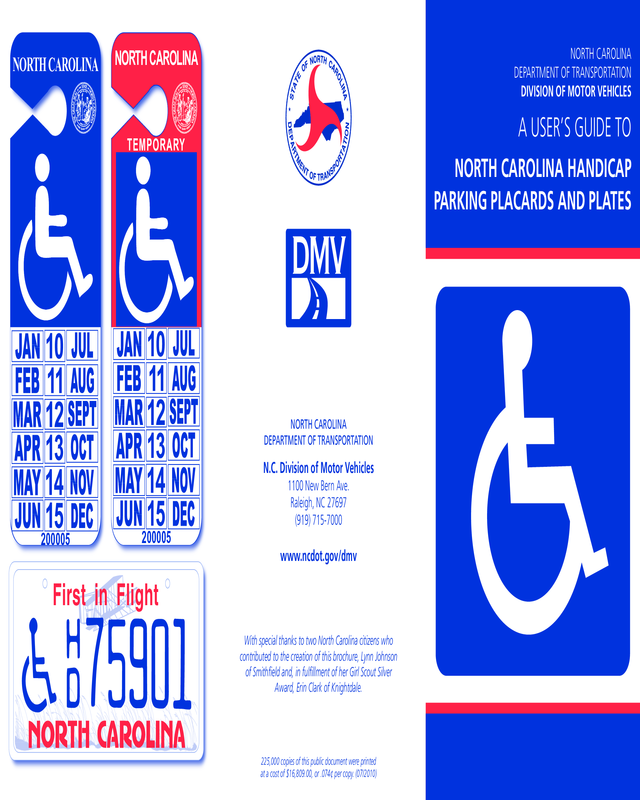Fillable Printable Handicap Parking Placard & Plate User Guide
Fillable Printable Handicap Parking Placard & Plate User Guide

Handicap Parking Placard & Plate User Guide

A USER’S GUIDE TO
NORTH CAROLINA HANDICAP
PARKING PLACARDS AND PLATES
North CaroliNa
DepartmeNt of traNsportatioN
N.C. Division of Motor Vehicles
1100 New Bern Ave.
Raleigh, NC 27697
(919) 715-7000
www.ncdot.gov/dmv
225,000 copies of this public document were printed
at a cost of $16,809.00, or .074¢ per copy. (07/2010)
NORTH CAROLINA
DEPARTMENT OF TRANSPORTATION
DIVISION OF MOTOR VEHICLES
200005
NORTH CAROLINA
200005
NORTH CAROLINA
TEMPORARY
First in Flight
With special thanks to two North Carolina citizens who
contributed to the creation of this brochure, Lynn Johnson
of Smithfield and, in fulfillment of her Girl Scout Silver
Award, Erin Clark of Knightdale.

North Carolina law provides for parking assistance to vehicle
owners whose medical professionals have certified as being
unable to walk without assistance or who have restrictions caused
by lung disease, defective vision, or cardiac, arthritic, neurological
or orthopedic conditions (N.C. General Statutes 20-37.6).
The North Carolina Division of Motor Vehicles provides three types
of handicap licensing:
• Five-year handicap parking placard
• Temporary (up to six months) handicap parking placard
• Handicap driver registration plate/tag
HOW DO I OBTAIN A HANDICAP PLATE OR PARKING
PLACARD?
Your doctor must certify to NCDMV that you have a mobility
impairment linked to one or more of the conditions listed above.
You may obtain an application form for a handicap parking
placard/tag from any DMV license plate agency, or download
one at http://www.ncdot.org/dmv/vehicle_services/licenseplates/
handicapped.html. Your doctor’s office may also provide the
application forms.
WHO MAY USE A HANDICAP PLATE OR PLACARD?
Placards and plates are to be used only for transporting the
handicapped to whom they are issued. Parking placards must
be displayed inside the vehicles from the rearview mirror. Plates,
which carry the International Symbol of Access — a wheelchair
— replace usual license plates on the back of the vehicle.
Only the individual who is issued the placard or plate may use
handicap parking privileges.
WHEN MAY I USE HANDICAP PARKING?
Handicap parking may be used ONLY when the person to
whom the placard or plate was issued is in the vehicle. If that
person is not in the car, the driver MAY NOT use the handicap
placard/plate.
MAY I USE SOMEONE ELSE’S HANDICAP PLACARD IF…
Example 1: You are a disabled veteran with a handicaplicense
tag. Your grandchild borrows your car. They may NOT use
handicap parking and will be subject to posted fines if they
do so. You should warn them NOT to park in handicap
parking spaces.
Example 2: You will “only be a minute,” so you use your
Mom’s handicap placard even though she is not with you. This
is illegally parking in handicap spaces and you will be subject to
posted fines.
Example 3: You have sprained your ankle. You use your Mom’s
handicap placard, although she is not along. Is this legal? The
answer is no. You have not been found to be disabled. While
you have a temporary disability, the placard was not issued to
you. Therefore, you cannot legally park in handicap spaces.
IS THE NORTH CAROLINA HANDICAP PLACARD OR PLATE
RECOGNIZED IN OTHER STATES?
Yes. Other states recognize North Carolina placards and plates.
In addition, local law enforcement will honor valid placards from
other states or countries.
HOW DO I RENEW A PARKING PLACARD?
• Temporary placards are issued for one to six months and are
therefore not renewable.
• Five-year placards may only be renewed with the recertification
of a physician. Each placard costs $5.
• Handicap driver registration plates/tags must be renewed by
sticker annually and recertified by your physician every five
years. The regular registration plate fee applies to these plates.
WHERE CAN I PARK USING MY PLATE OR PLACARD?
If you have a valid handicap placard or plate, you may use spaces
marked for the handicapped without time limits. In many, but
not all jurisdictions, you may also park longer than posted in any
non-handicap parking space.
WHERE SHOULD I NOT PARK?
You may not park in fire lanes, loading zones, or any area
marked with striped lines. You may not obstruct the entrance or
exit to a property with your vehicle.
WHAT IS THE PENALTY FOR PARKING ILLEGALLY IN A
SPACE DESIGNATED FOR PERSONS WITH DISABILITIES?
Parking spaces for handicapped driver/owners are required to
be marked with a sign designating the maximum penalty for
parking in the space in violation of the law. It is unlawful to park
or leave standing any vehicle that does not carry a valid handicap
placard or plate in a handicap parking space. It is also unlawful
to block or obstruct a curb ramp or curb cut for handicapped
persons, as provided under the North Carolina Building Code.
Violations of these parking requirements are infractions which
carry penalties of $100 to $250.
Additionally, law enforcement officers may order a vehicle
in violation of this section to be towed. Provisions relative to
parking in spaces marked and reserved for handicapped people
are enforced by state, county and municipal authorities in their
jurisdictions and may be subject to citations and fines.
WHAT IS A “VAN ACCESSIBLE” HANDICAP
PARKING SPACE?
The average handicap space is 60 inches wide while van
accessible spaces are 96 inches wide. They provide enough room
for ramps or lifts to allow wheelchairs to exit safely.
WHAT ARE THE STRIPED AISLES IN PARKING LOTS?
Striped aisles, or access aisles, are used for wheelchair transfer,
walker use and for ramps and lifts to operate safely. Van
accessible spaces are usually next to access aisles. Leave striped
access aisles free for wheelchairs and walkers.
WHICH HANDICAP SPACE SHOULD I PARK IN?
If you are handicapped and use a small vehicle, do not park in
the van accessible space. Park in the space that fits your vehicle
and your disability. Save the van accessible space for a wheelchair
accessible van.
north carolina handicap parking placards and plates



